Deputy Premier in Sweden to explore sustainable forestry collaboration
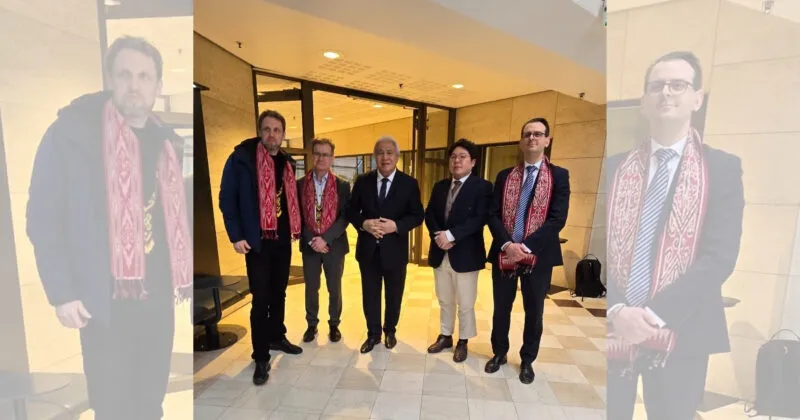
By DayakDaily Team KUCHING, April 28: Deputy Premier of Sarawak Datuk Amar Awang Tengah Ali Hasan had a networking session with Business Sweden, an agency that promotes Swedish companies’ global growth and foreign direct investors’ expansion in Sweden.Awang Tengah was in Stockholm for a two-day working visit to promote Sarawak as an investment destination for Swedish investors, as well as to explore opportunities for collaboration in forest management, plantation, and technology to process planted timber species. According to a press release, the Deputy Premier was briefed by Swedish Forest Agencies, Swedish Wood Building Council, Ecco Innovation Foundation, and Billerud on topics such as the development of forest industries in Sweden, the use of engineered wood to construct timber structures, Ecco Innovation Foundation collaboration with other countries in Southeast Asia, and the pulp and paper industry.The industry has a structured mission to achieve a circular bio-based society for Sweden. During the same session, Paul Valentine, General Manager of Sarawak Planted Forest Sdn Bhd, provided an overview of the development status of planted forests in Sarawak, as well as opportunities for future collaborations and investments in digital technology, mechanisation for planted forest harvesting, and the production of high value-added products such as pulp, paper, engineered wood, and biomass fuel for the Swedish business communities. The Deputy Premier invited the Swedish business community to consider investing in Sarawak’s forestry, forest plantation, and wood-related industries. He pointed out that Sarawak is transitioning to a sustainable and renewable wood-based industry that uses material from forest plantations to produce engineered wood, biomass fuels, pulp, and paper.Sarawak also a geographic advantage because it is close to large markets with high growth rates, such as China, Japan, India, South Korea and Australia. Meanwhile, Business Sweden sees potential opportunities in Sarawak for research and innovation, digital forest management applications, forest industries for wood structure construction, and human capital development, according to the press release. Business Sweden, in collaboration with industries and agencies, will continue to engage in dialogues with Sarawak to identify areas of mutual interest that can be considered and implemented in the future. Also present during the working visit were Swedish Ambassador to Malaysia Dr Joachim Bengstrom; Deputy Minister for Urban Planning, Land Administration, and Natural Resources, Datuk Len Talif Salleh; Advisor to the Ministry of International Trade, Industry, and Investment (MINTRED), Dato Sri Mohd Naroden; Director of Forests, Datu Hamden Mohammad; Permanent Secretary of MINTRED, Dzulkornain Masron; General Manager of Sarawak Timber Industry Development Corporation (STIDC), Zainal Abidin Abdullah; Advisor to STIDC, Datu Hashim Bojet; CEO of Invest Sarawak Timothy Ong; and CEO of PUSAKA Capital Sdn Bhd, Mohd Nor Topek Julaihi. – DayakDaily
Premier: Sarawak to replace coal with biomass at Sejingkat, Balingian power plants
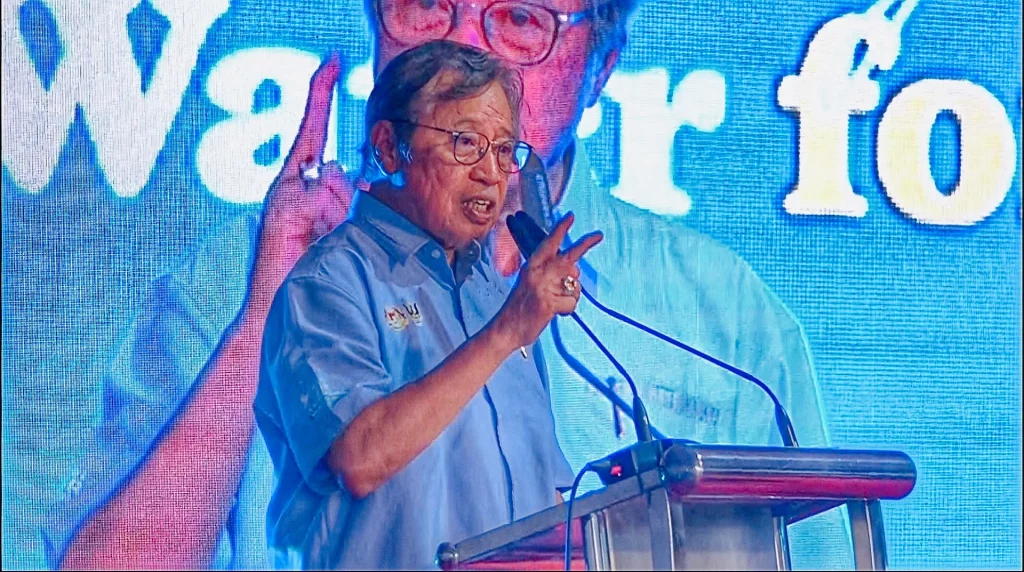
KUCHING (April 28): Sarawak plans to replace the use of coal at the Sejingkat and Balingian power plants with biomass, in line with the state’s efforts to develop clean and sustainable energy, says Datuk Patinggi Tan Sri Abang Johari Tun Openg. Speaking to reporters after gracing the national-level World Water Day celebration at Kuching Waterfront today, the Sarawak Premier said doing so would not only reduce carbon emission but also provide economic benefits. He cited the Drax facility in the United Kingdom, which he visited recently during an official trip to the UK, as an example of a power plant successfully transitioning from coal to biomass as a source of energy. “At Drax, they previously used coal but have now replaced it with biomass. The investment (to change) is not high because the system is very similar. “This is what we want to use for Sejinkat and Balingian. We want to decommission coal. I have calculated that we can use our biomass to generate power,” he said. Abang Johari explained that switching from coal to wood waste could generate power exceeding 500 megawatts. “Now we only need to strengthen the boiler and also from the point of view of the motor machine, and this will enable Sejingkat (plant) to generate even up to one gigawatt,” he said. Touching on his visit to the Drax power station, the Premier said the insight he gained has provided him a valuable framework in further developing the state’s renewable energy sector, adding he will discuss this with state utility company Sarawak Energy Berhad. He also expressed happiness that the European community has recognised Sarawak’s role in addressing climate change. “We will share the technology we have in renewable energy production including biomass,” he said. Separately, Abang Johari said the implementation of cascading dams in the hinterland will be carried out elsewhere if the local population objected to it. “If they disagree, the government will move (the project) to another area. If they feel suspicious, we will go to another place where the people want (the project to be implemented). “Now we are implementing the project near Sungai Kanowit and Song. In Kapit, they want this cascading source, and we have a new technology that I mentioned as a tank elevator. “This depends on the theory of gravity, which means that the flow of water can generate energy,” he said. Also present at the event were Deputy Prime Minister Datuk Seri Fadillah Yusof, Deputy Premier Datuk Amar Dr Sim Kui Hian, State Secretary Datuk Amar Mohamad Abu Bakar Marzuki, Minister of Utility and Telecommunication Datuk Sri Julaihi Narawi and his deputy minister Datuk Liwan Lagang, and Fadillah’s deputy minister Akmal Nasrullah Mohd Nasir.
SEDC Energy, MOBILUS partner up to fuel autonomous rapid transit system with hydrogen
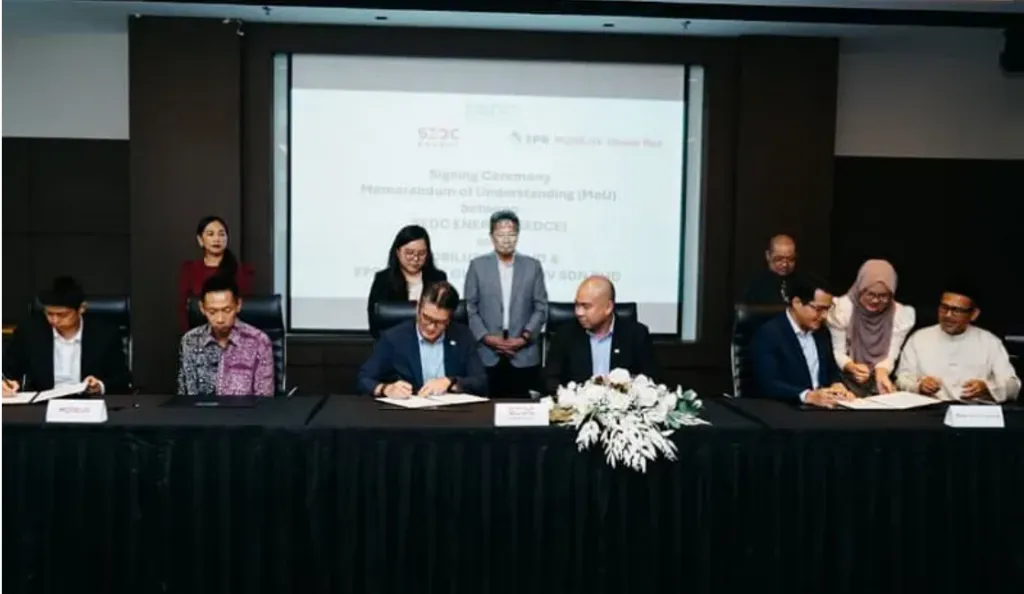
By Dayak Daily Team KUCHING, April 26: SEDC Energy, a wholly owned subsidiary of the Sarawak Economic Development Corporation (SEDC), has entered into a Memorandum of Understanding (MOU) with MOBILUS Sdn Bhd (MOBILUS) and EPR Mobilus Global Rail JV SDN BHD (EMGJV) to supply hydrogen for the Autonomous Rapid Transit (ART) system. This collaboration, according to a media release today, aligns with the Sarawak government’s vision to promote the use of new and clean energy for urban publictransportation, particularly within the framework of the Kuching Urban Transportation System (KUTS) project. The adoption of hydrogen fuel cell technology for ART contributes to KUTS’ goal of reducing urban traffic congestion and stimulating productivity and economic growth. Within the KUTS project, MOBILUS Sdn Bhd is responsible for the design, engineering, comprehensive testing, and commissioning of the ART system, while SEDCE will supply hydrogen to power the ART vehicles. SEDCE is actively participating in the energy transition towards a sustainable future, in line with the Post-Covid Development Strategy (PCDS) 2030 and National Energy Transition Roadmap (NETR). Through innovative energy solutions and strategic partnerships, SEDCE aims to foster economic growth and environmental sustainability. Robert emphasised the significance of KUTS’ success in delivering cleaner transportation for the community and Sarawak, marking a proud achievement for SEDCE in advancing clean energy initiatives. “This is another proud moment for SEDCE in the new and clean energy in Sarawak. Our efforts today, despite challenges, will define tomorrow and the generations to come,” he said in the statement.Lai expressed confident that the collaboration’s ability to enhance testing and commissioning efforts for KUTS while also driving future advancements in hydrogen technology within the region. “Together, we are proud to be at the forefront of innovation, driving positive change and shaping the future of urban transportation in Sarawak, Malaysia and beyond,” she remarked. Earlier this year, on Feb 26, SEDCE signed a MoU with Sarawak Metro, the implementing body of KUTS. Under this agreement, SEDCE assumes responsibility for the development, construction, commissioning, operation, and maintenance of the Rembus H2 plant and refueling facility, along with related products and materials for the ART system. – DayakDaily
Awg Tengah: Talent devt across various sectors vital in ensuring Sarawak’s status on global platform
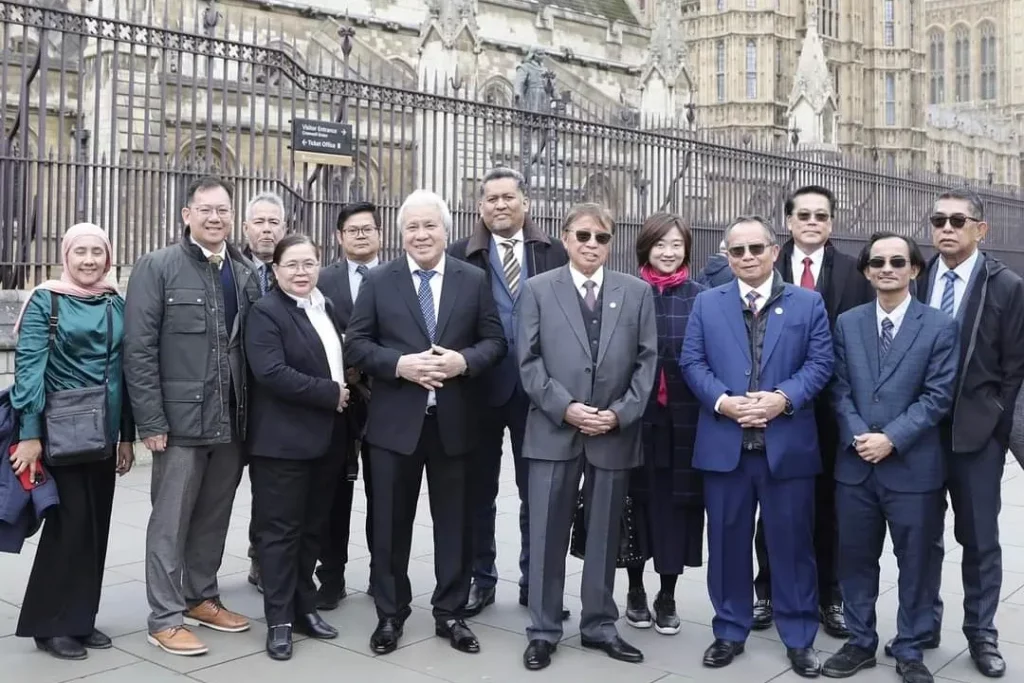
KUCHING (April 24): Sarawak is looking into developing talents in the design of semiconductor products using silicon, germanium and gallium arsenide, says Deputy Premier Datuk Amar Awang Tengah Ali Hasan. He was cited by Sarawak Public Communications Unit (Ukas) in a report as saying that this could be achieved by enhancing collaboration with industry players in the UK. “Talent development in various sectors for the people of Sarawak is important to ensure Sarawak’s position in the global platform. “Sarawak designers are capable of being on par with international designers, given that there are now foreign companies that have bought semiconductor products produced in Sarawak,” said Awang Tengah, who is part of the Sarawak delegation led by Premier Datuk Patinggi Tan Sri Abang Johari Tun Openg in a working visit to the UK. They inspected the advanced technology employed at the Drax Power Station and oversaw the signing of a memorandum of understanding between Sarawak Microelectronics (SMD) Semiconductor and UK-based CSA Catapult. The delegation is now in Poznan, Poland where the Premier is set to present Sarawak’s role in renewable energy security, decarbonisation, and environmental sustainability at the Central European Hydrogen Technology Forum. On another matter, Awang Tengah, who is also the Second Minister of Natural Resources and Urban Development, said Samalaju High Tech Park remained one of the good locations for foreign companies to come and establish their companies with a workforce made up of local residents, and it could also be used as a place where talent development could be forwarded. On biomass technology, Awang Tengah – also the Minister of International Trade, Industry and Investment Sarawak – said the visit to the Drax Power Plant in Leeds in the UK, was very fruitful and significant because it showed the delegation present how wood pellets were used to generate clean energy in the United Kingdom. “In this regard, a local company like Samling has exported wood pellets to foreign countries for that purpose. “Therefore, we have the potential to develop technology using wood pellets to generate energy in the near future,” he said.
InvestSarawak, Toyo ink MoU to advance state govt’s energy transition agenda
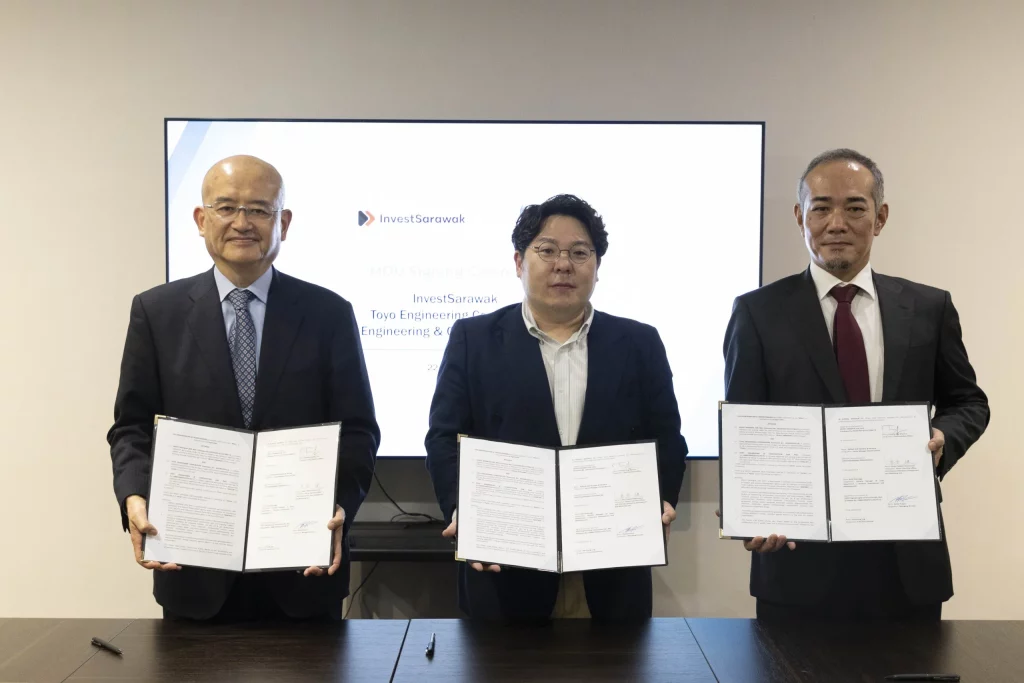
KUCHING (April 22): InvestSarawak and Toyo Engineering Corporation, along with its subsidiary Toyo Engineering & Construction Sdn Bhd, signed a Memorandum of Understanding (MoU) today in a move to advance the Sarawak government’s energy transition agenda. This strategic collaboration aims to help Toyo explore and facilitate potential investment projects in Sarawak in alignment with the company’s energy transition strategies, according to a press release. The MoU outlined the commitment of both parties in establishing a cooperative framework that will foster collaboration on potential energy projects critical to the state government’s energy transition initiatives. Toyo expressed its readiness to assist in the development of value chain planning services essential for realising these initiatives. Such initiatives include developing green hydrogen projects, carbon capture and storage (CCS), waste-to-energy projects that convert organic waste materials into energy, energy storage solutions such as battery storage or pumped hydro storage, and smart grid technology to enhance the efficiency and reliability of the electrical grid. InvestSarawak chief executive officer Timothy Ong said the partnership with Toyo is a testament to Sarawak’s commitment to embracing clean and sustainable energy sources that will propel the state’s economic and social development forward. “This collaboration will leverage Toyo’s global insights and technological advancements to enhance our local capabilities,” he said. Toyo Engineering Corporation senior executive officer and unit director of the Business Development and Marketing Unit Casey Takeshi Matsumuro said: “We are honoured to support Sarawak’s ambitious energy goals. “This collaboration allows us to bring our expertise and technology to the forefront of Sarawak’s energy landscape, aligning with our mission to contribute to sustainable growth globally.” Under the purview of the Ministry of International Trade, Industry and Investment, InvestSarawak serves as the one stop centre dedicated to attracting investments that align with Sarawak’s vision for 2030 for sustainability and growth. Toyo, with its track record and expertise in engineering, procurement, construction, and technical services across various sectors, including oil and gas, petrochemicals, and renewable energy, brings its global experience and innovative technologies to this partnership. With 87 ammonia plants and over 48 ammonia storage tanks globally, the corporation is positioned to contribute significantly towards sustainable energy solutions in Sarawak. The partnership is expected to not only support the transition to renewable energy in Sarawak but also stimulate local employment and technological development, marking a significant milestone in the region’s economic landscape.
Sarawak Gas Roadmap
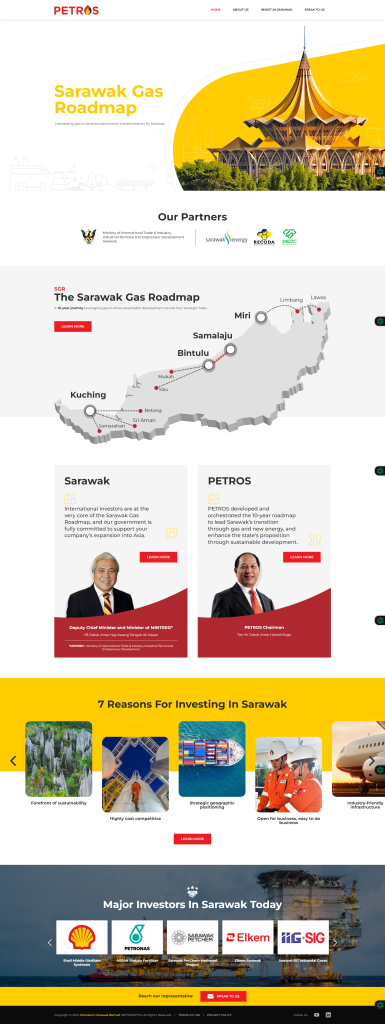
https://sgr.petroleumsarawak.com/
Malaysia’s Sarawak targets green energy powerhouse status

InvestSarawak CEO sees renewables as ‘cornerstone’ of sustainability for state KUCHING, Malaysia — In an ambitious pivot away from its entrenched oil and gas legacy, Malaysia’s Sarawak is working to carve out a new identity as Southeast Asia’s emerging green energy powerhouse, the head of the state’s investment agency told Nikkei Asia. The state, located on the island of Borneo that Malaysia shares with Indonesia and Brunei, possesses immense energy resources. Its operational hydroelectric dams include Bakun and Murum, while the under-construction Baleh Dam is slated to add 1,285 megawatts to the grid by 2026. Sarawak Energy, the state’s power company, estimated that Sarawak has a potential 20,000 MW of hydropower over about 50 sites, of which 3,452 MW has been harnessed. The Bakun Dam, Sarawak’s largest hydroelectric project and one of Southeast Asia’s most significant, was completed in 2011. The 7.4 billion ringgit ($1.56 billion) facility spans the Balui River and boasts a capacity of 2,400 MW. Its construction was part of a broader initiative to reduce reliance on fossil fuels and promote sustainable energy sources within the region. “Sarawak is transcending its traditional energy models to embrace a future where renewable energy is the cornerstone of economic and environmental sustainability,” Timothy Ong, chief executive of InvestSarawak, said in an interview last month. “The future of Sarawak lies in green energy, and our commitment to this vision is unwavering,” Ong said. “Through strategic investments, partnerships, and a dedicated workforce, we are not just imagining a sustainable future; we are actively building it.” The effort is paying off, attracting a slew of foreign direct investment into the green sector. In 2023, Sarawak drew 21.4 billion ringgit in investments, with a significant chunk funneled into manufacturing and renewable energy initiatives, according to Awang Tengah Ali Hassan, the state’s deputy premier, as reported by the state information office earlier this month. State-linked Sarawak Energy signed a memorandum of understanding in October last year with the United Arab Emirates’ Abu Dhabi Future Energy Company, also known as Masdar, as part of joint effort to develop 2 gigawatts of renewable energy projects in Malaysia at an investment value of $8 billion, according to the Malaysian Investment Development Authority. One of the plans includes developing 1 GW of renewable energy projects in Sarawak. Beyond hydropower, Sarawak is also aiming to become a leader in the nascent hydrogen energy industry in the region. Collaborations with Japanese and South Korean companies such as SK Energy, Sumitomo Corp. and Eneos highlight the state’s role in the ongoing international push towards hydrogen as a clean, alternative fuel source. “These ventures bring more than just investments; they bring knowledge and innovation, propelling Sarawak onto the global stage of renewable energy,” Ong said. Sarawak’s green agenda also extends to its burgeoning digital economy, with plans to power tech industries and data centers using renewable energy. The initiative aligns with global demand for sustainable digital infrastructure, marrying digitalization with green energy in a move that Ong describes as “setting the stage for a future where digital and green go hand in hand.” The road to a green future, however, is not without challenges. Sarawak is grappling with the need for skilled manpower and technological skills to drive its renewable ambitions. To this end, Ong said that InvestSarawak is focusing on education enhancements and talent repatriation strategies for “building a future-ready workforce for Sarawak’s renewable energy sector.” Ong said: “We’re focusing on enhancing local education and creating enticing opportunities for our people abroad to return and contribute to our green ambitions. This is more than just a job; it’s about building a sustainable future for our next generations.” Sarawak can play a key role in the renewable energy industry because the state can provide cost-competitive electricity tariffs. Ong reiterated that it will be serving as an anchor for energy intensive digital, advanced manufacturing. “For me, the focus is not on the value of the investment,” he said. “My focus is on our economic complexity. On investment value, it’s pointless if we don’t have sophistication in our supply chain and that is what keeps your multinationals in the state, so you can always have the attraction [for] retention of talents.”
Kerjasama lebih erat antara MINTRED dan MITI tarik pelabur tenaga hijau ke Sarawak
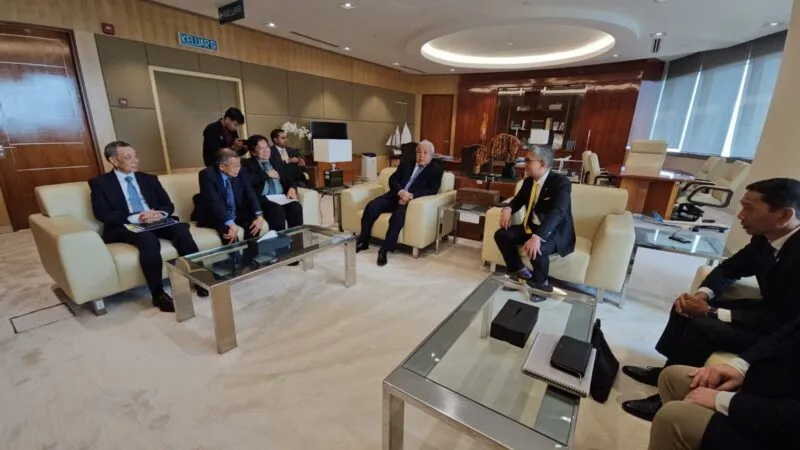
KUCHING, 25 Mac: Dalam usaha menarik lebih banyak pelaburan ke Sarawak, Kementerian Perdagangan Antarabangsa dan Pelaburan (MINTRED) Sarawak menjalinkan kerjasama lebih erat dengan Kementerian Pelaburan, Perdagangan dan Industri (MITI). Timbalan Premier Sarawak Datuk Amar Awang Tengah Ali Hasan berkata perbincangan bersama Menteri Pelaburan, Perdagangan dan Industri, Tengku Datuk Seri Zafrul Tengku Abdul Aziz hari ini merangkumi untuk menjadikan Sarawak sebagai hab tenaga hijau dan diperbaharui di rantau ini. “Ia menjadi keperluan dalam menarik pelaburan yang betul terutamanya pemerangkapan, penggunaan dan penyimpanan karbon (CCUS) dan hidrogen hijau,” katanya dalam kenyataan. Awang Tengah yang juga Menteri Perdagangan Antarabangsa dan Pelaburan Sarawak berkata, perlu ada beberapa insentif disediakan kepada pelabur, malah dasar yang kukuh untuk memudahkan pertumbuhan industri ini. Perbincangan tersebut turut disertai Timbalan Menteri Perdagangan Antarabangsa dan Pelaburan Sarawak, Datuk Dr Malcom Mussen Lamoh, Penasihat MINTRED Dato Sri Mohd Naroden Majais, Setiausaha Tetap MINTRED, Dzulkarnain Misron dan Ketua Pegawai Eksekutif Lembaga Pembangunan Koridor Wilayah (RECODA), Datu Ismawi Ismuni dan Ketua Pegawai Eksekutif InvestSarawak, Timothy Ong – TVS
Dr Sim: Govt studying proposal to build railway linking Bintulu Port to Nusantara
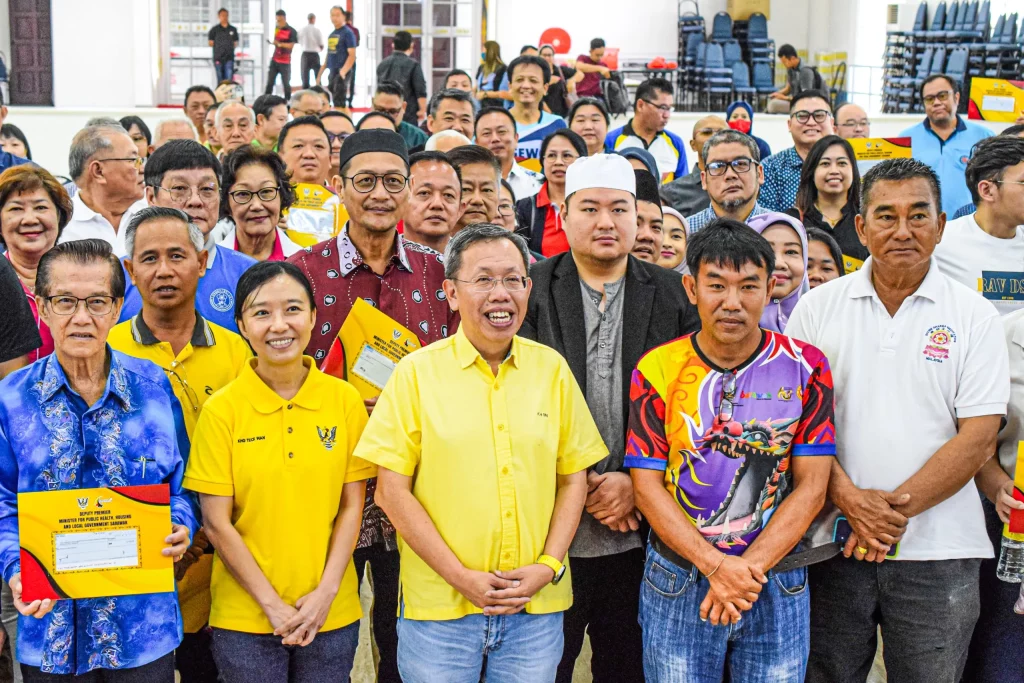
KUCHING (March 24): The government is studying a proposal to build a railway linking Bintulu Port to the new capital of Indonesia, Nusantara, said Deputy Premier Datuk Amar Dr Sim Kui Hian. He said Bintulu Port’s strategic location in Borneo could facilitate the movement of goods from Sarawak to Indonesia using a shorter travel distance compared to shipping routes. “Can you imagine if the port does not belong to us (the state government) and we want to potentially build a railway line all the way to the new capital of Indonesia?” he said during an event distributing grants to 45 non-governmental organisations (NGO) at Sarawak United Peoples’ Party (SUPP) headquarters here today. Noting that the distance between Bintulu Port and Nusantara is only a few hundred kilometres, Dr Sim said a high-speed rail from China could cover the distance within three hours compared to ships which would take around two days. On Friday, a Memorandum of Understanding (MoU) was signed between federal Transport Minister Anthony Loke and state Deputy Premier Datuk Amar Douglas Uggah Embas to the facilitate the change of status of Bintulu Port from being a federal port to a state port by this year. The MoU signing, which was witnessed by Prime Minister Datuk Seri Anwar Ibrahim and Sarawak Premier Datuk Patinggi Tan Sri Abang Johari Tun Openg, will also see the entire operation of Bintulu Port handed over to the Sarawak government by 2025. On another note, Dr Sim remarked that Sarawak has entered into a phase of nation building and the state government led by Abang Johari has taken the initiatives to take over Bintulu Port, MASwings and acquiring significant stakes in Affin Bank. He said the state government will also be providing free tertiary education at state-owned universities to about 20,000 Sarawakian students a year starting 2026 with a cost of about RM30,000 per year for each student. The deputy premier further highlighted that Sarawak aspires to achieve a gross domestic product (GDP) of RM282 billion in the next six years and the state has been counted as the fifth largest producer of gas in the world. Dr Sim also pointed out Sarawak is fast approaching towards an ageing society with the lowest birthrate in the country.
Singapore leads Asian peers in attracting foreign investments: Report

SINGAPORE – Singapore is the most attractive country in the region for foreign investments, but it falls behind some advanced economies in terms of environmentally friendly and socially inclusive growth, according to a new index. The Milken Institute’s Global Opportunity Index ranked Singapore first among its Asian neighbours in 2023, and 14th among the 130 countries studied globally – up four places from 2022. Hong Kong at 15th and Japan at one spot below were the other two Asian economies in the top 20 globally. Denmark came in first globally, with Sweden dropping to second, followed by Finland in third. The United States moved up one spot to fourth. Dr Maggie Switek, the Milken Institute’s senior director and the report’s lead author, told The Straits Times that Singapore’s climb up the league table was due to relatively strong economic growth. Its high position was also driven mainly by its strength in “business perception”, which measures the ease of doing business and the regulatory framework facilitating contract enforcement and dispute resolution. It also fared well in the “institutional framework” category, which assesses the extent to which a country’s institutions safeguard the rights of investors and the safety of their assets. The country led the way in the subcategories of investor rights and transparency. “It means that overall investment conditions remain strong, which is also reflected in Singapore’s capital inflows. The strength of investor rights coupled with its relatively low business constraints mean that investors should feel comfortable operating in Singapore,” Dr Switek said. Foreign direct investment (FDI) inflows to Singapore reached a record high of US$141.2 billion (S$189 billion) in 2022, up from US$131.1 billion in 2021, noted a United Nations report. This made the country the third-largest FDI recipient worldwide after the US and China. Singapore also accounted for almost two-thirds of flows to Asean countries. “However, the country could do better on its indicators related to environmentally friendly and socially inclusive growth, which are reflected in its relatively low ranking in ‘future environment for growth’,” said Dr Switek. Singapore scored below the average of advanced economies in the “economic fundamentals” category, which captured macroeconomic performance, workforce talent and efforts to create a resilient and sustainable economy and society. This was largely due to its relatively weak performance in the “future environment for growth” sub-category, which includes measures such as air pollution and the proportion of women in government. Dr Switek said Singapore also ranked below some of its regional competitors such as Japan and South Korea in this area. The Milken index is based on 100 indicators classified into five categories – business perception; economic fundamentals; financial services; institutional framework; and international standards and policy. The variables within the five categories measure all angles of a country’s investment potential, including economic openness and performance, business constraints and workforce talent and diversity. Data sources include the World Bank, the International Monetary Fund and the United Nations. Malaysia offered the best investment conditions among emerging and developing Asian economies. It ranked 27th globally, ahead of Thailand at 37th and 39th-placed China, which lost some appeal to investors due to rising geopolitical tensions with the US. The report noted a continued shift in investor sentiment in favour of Latin American countries as capital inflows to China turned negative in 2022 for the first time since 2015. Since then, Latin America has experienced a surge in investment inflows, with Mexico and Brazil jointly accounting for more than 60 per cent of foreign direct investment in the region. However, it noted a strong momentum behind China’s innovation economy that could rival the US and other advanced economies. The mainland surpassed the US in the annual number of scientific publications for the first time in 2019, and since then the gap has widened, it said.

